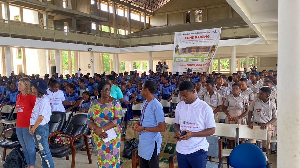 The students were advised to engage in open conversations about menstrual health
The students were advised to engage in open conversations about menstrual health
The Young Trust Foundation, a Non-Governmental Organization (NGO), has distributed about 1,000 sanitary pads to nine (9) schools in Accra to mark 2024 World Menstrual Hygiene Day and to raise awareness of the stigma associated with menstruation.
The celebration, which was under the theme "Empowering Young School Girls: My Period, My Confidence," targeted beneficiary schools from the Adentan, Kpone, and Shai Osudoku Municipal Assemblies in the Greater Accra Region.
The CEO of the Young Trust Foundation, Abigail Sarpong, announced that the NGO was gearing up to reach more locations, schools, and females, advocating for the abolishment of period poverty and creating an environment where women can thrive.
On the back of this, she noted that her outfit was pushing for policy modifications as well as lobbying with governmental agencies to eliminate sanitary pad levies and give menstrual health education a top priority.
"To guarantee that every girl has access to high-quality menstrual hygiene products, we will investigate long-term solutions," she stated.
The Director-General of the Ghana TVET Service, Mawusi Nudekor Awity, who was represented by Doris Makafui Dzene, acknowledged that menstruation was a natural process, a sign of a healthy body, and a symbol of fertility; however, the subject was often associated with stigma.
She said there had been significant work in addressing the barriers, but more work needs to be done to create an environment of openness, understanding, and support.
She revealed that economic empowerment initiatives, including skills acquisition and TVET programs, had the potential to offer sustainable solutions to address the challenge of menstrual hygiene.
She indicated that by providing women and girls with income-generating opportunities, they could afford to purchase menstrual hygiene products and manage their menstruation with dignity.
The Director for the Valley View University Basic Schools, Beatrice Adaboh, advocated for subsidized prices for sanitary pads to remove the barriers that prevent females from accessing menstrual products.
"Some of the girls come from poor backgrounds, and you must do this every month. It is a monthly expenditure. It's not like I am buying a dress for 6 months; I won't go to the shop. If the prices go down, that will be excellent. It should be affordable to everybody," she said.
She underscored the importance of educating the girl child, indicating that it had a ripple effect on future sensitization projects in society.
She called for more events to inform females of their sexuality and sexual reproductive system.
The Adentan Municipal Education Directorate, Dinah Osam-Tawiah, explained that the lack of access to menstrual hygiene products for girls was a significant barrier to their education, leading to a cycle of missed learning opportunities that could have lasting effects on their futures.
She urged parents and educators to educate those around them about menstrual health and hygiene to end the stigma by encouraging them to engage in open conversations about reproductive health and providing them with accurate information and resources.
She further advised the girls to judiciously utilize their time to continuously learn about their bodies, take care of themselves, and understand the beauty of being a woman.
"Remember, your period is not a limitation but a celebration of your unique journey," she told the students.
The Ministry of Education (MoE), the Ghana Education Service (GES), Valley View University Basic Schools, Faytex, Done-Tech Solutions, Ghana TVET Service, Arthro Synergeio, and Digi Craft supported the program.